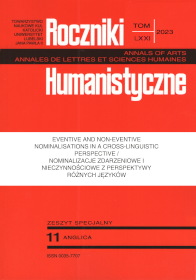The Meaning of Nominalisation
The Meaning of Nominalisation
Author(s): Pius ten HackenSubject(s): Language and Literature Studies, Theoretical Linguistics, Morphology
Published by: Towarzystwo Naukowe KUL & Katolicki Uniwersytet Lubelski Jana Pawła II
Keywords: transposition; word formation rules; onomasiological coercion; Parallel Architecture; process–result alternation
Summary/Abstract: Nominalisation is a morphological process producing a noun on the basis of an input that may belong to various categories. As noun is a syntactic category, whether something is a noun can only be decided on the basis of syntactic evidence, not on the basis of its meaning or morphological behaviour.As a theoretical framework, I use Jackendoff’s Parallel Architecture (PA) as a basis, but I argue for a separate word formation component. The central difference between word formation rules and regular lexical entries is that the latter contribute to the production of the representation of interpreted performance, whereas the former produce new lexical entries, thus changing competence. As a consequence, an expression in interpreted performance needs the identification of a reference in the communicative context, whereas word formation needs the identification of a concept in a speaker’s knowledge, which involves onomasiological coercion.A distinction can be made between two types of nominalisation, which I illustrate with Dutch examples. In one type, the meaning is changed, e.g. jager ‘hunter’ from jagen ‘huntv’, in the other it is not, e.g. telling ‘countn’ from tellen ‘countv’. Nominalisations of the latter type are transpositions. This distinction can be made both for deverbal and for deadjectival nouns.Rules changing representations in PA can be classified in seven classes according to which of the structures they modify. Only those that change conceptual structure qualify for being part of the word formation component. This excludes transpositions. Many nouns can be interpreted as either a transposition or a result of word formation. An example is vertaling ‘translation’, which can refer to the process or the result of translation. I argue that there is a word formation rule that produces the second reading on the basis of the first, and show that this rule belongs to a type that is predicted by the typology of rules for modifying representations in PA.
Journal: Roczniki Humanistyczne
- Issue Year: 71/2023
- Issue No: 11S
- Page Range: 129-147
- Page Count: 19
- Language: English

